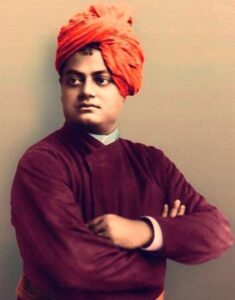 Swami Vivekananda |
|
|---|---|
| Full Name | Narendranath Datta |
| Born | January 12, 1863 |
| Birthplace | Kolkata, West Bengal, India |
| Died | July 4, 1902 (aged 39) |
| Nationality | Indian |
| Occupation | Monk, Philosopher, Spiritual Leader |
| Years Active | 1886–1902 |
| Known For | Ramakrishna Mission, Speech at Chicago (1893) |
| Education | Presidency College, Calcutta University |
| Spouse | None (celibate) |
| Website | belurmath.org |
Swami Vivekananda was born as Narendranath Dutta in a middle-class Bengali family in Kolkata. He was an exceptionally bright child and was particularly inclined towards philosophy, spirituality, and logic from a very young age. Vivekananda attended the Presidency College, Kolkata, where he was introduced to Western philosophy and the works of great Indian philosophers.
He was an exceptional student with an interest in Vedanta, a major branch of Indian philosophy, and the teachings of Ramakrishna Paramahamsa, a renowned saint. Swami Vivekananda became a disciple of Ramakrishna, who deeply influenced his spiritual journey.
Spiritual and Philosophical Journey
In 1886, after the death of his guru, Ramakrishna, Vivekananda took up the task of spreading his teachings. He adopted the name Swami Vivekananda and began his efforts to revive Hinduism’s spiritual essence in the modern world. He was particularly drawn to the Vedantic principles of universal brotherhood, human dignity, and the idea that divinity is present in all human beings.
His teachings revolved around the unity of all religions, and he was known for his charismatic personality and powerful speeches that inspired millions.
1893 Chicago Parliament of Religions
Swami Vivekananda gained international recognition when he represented India at the Parliament of the World’s Religions in Chicago in 1893. His speech on “Universal Brotherhood” opened with the famous words:
“Sisters and brothers of America!”
This speech made him an icon of Indian spirituality on the global stage. He introduced Hinduism and Vedanta to the Western world, and his powerful message on tolerance and acceptance of all religions left an indelible mark.
Contributions to Indian Society
Swami Vivekananda worked tirelessly for the upliftment of the Indian society. Some of his major contributions include:
-
Ramakrishna Mission (1897): Founded with the objective of serving humanity and promoting spiritual and social welfare. The mission focuses on educational and healthcare services, particularly for the underprivileged sections of society.
-
Promotion of Education: He emphasized the importance of education, not just for intellectual growth but for character development and the overall progress of the nation.
-
Focus on Youth: Vivekananda believed that the youth of India could play a pivotal role in its progress, urging them to embrace self-reliance, discipline, and dedication.
Legacy and Recognition
Swami Vivekananda’s thoughts and philosophies have influenced generations of people. He is regarded as one of the greatest spiritual and philosophical leaders of modern India.
-
Vivekananda Rock Memorial (1964) was built in his honor in Kanyakumari, where he meditated for inspiration before delivering his famous speech in 1893.
-
January 12, his birthday, is celebrated as National Youth Day in India, emphasizing the importance of youth empowerment.
-
His teachings are compiled in several books, including “Complete Works of Swami Vivekananda” and his famous “Meditations”.

